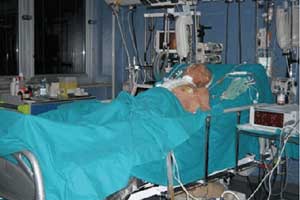- Home
- Editorial
- News
- Practice Guidelines
- Anesthesiology Guidelines
- Cancer Guidelines
- Cardiac Sciences Guidelines
- Critical Care Guidelines
- Dentistry Guidelines
- Dermatology Guidelines
- Diabetes and Endo Guidelines
- Diagnostics Guidelines
- ENT Guidelines
- Featured Practice Guidelines
- Gastroenterology Guidelines
- Geriatrics Guidelines
- Medicine Guidelines
- Nephrology Guidelines
- Neurosciences Guidelines
- Obs and Gynae Guidelines
- Ophthalmology Guidelines
- Orthopaedics Guidelines
- Paediatrics Guidelines
- Psychiatry Guidelines
- Pulmonology Guidelines
- Radiology Guidelines
- Surgery Guidelines
- Urology Guidelines
Low phosphate blood levels during ICU stay increase death risk

Low phosphate blood levels during ICU stay increase death risk, Finds a new study.
The presence of hypophosphatemia -- low levels of phosphate in the blood -- at admission increases the risk of death within 28 days in the intensive care unit (ICU). The results of the study have appeared in the journal BMC Anesthesiology.
Hypophosphatemia is an electrolyte order characterized by serum phosphate concentration < 2.5 mg/dL (0.81 mmol/L). It is the most frequently encountered electrolyte metabolic disturbances in critically ill patients in an intensive care unit with an incidence and prevalence ranging within 2.4–100%.
Phosphate is a vital component of the cell membrane, which has essential functions in ATP production, glycolysis, enzyme regulation and many other essential processes in the body. Maintaining normal serum phosphate levels is extremely important as phosphate supply disturbance can result in multiple organ system dysfunctions.
Low levels of serum phosphate (hypophosphatemia) can lead to diverse clinical manifestations, including myocardial dysfunction, diaphragmatic weakness, seizures, coma, rhabdomyolysis, and red blood cell dysfunction and depletion of energy. Therefore, the detection of phosphate metabolism abnormalities in ICU populations is crucial.
Although many studies have demonstrated episodes of hypophosphatemia during the intensive care unit stay is associated with increased mortality but whether it directly leads to higher mortality or is merely a marker of disease severity in the general ICU still remains to be investigated. Lichun Wang, The Sixth Affiliated Hospital of Sun Yat-Sen University, Guangzhou, China, and colleagues conducted this single-centre retrospective cohort study to determine whether patients with hypophosphatemia have higher 28-day mortality than patients with normal serum phosphate levels.
For the purpose, the researchers collected data from 1073 patients admitted to general ICU and then presented to the Sixth Affiliated Hospital, Sun Yat-sen University (Guangzhou City, Guangdong Province, China) from 1 January 2016 to 31 December 2017. They were divided into two groups based on the concentration of phosphorus at the time of ICU admission -- normal control group (serum phosphate levels 0.80–1.60 mmol/L) and a hypophosphatemia group (serum phosphate levels < 0.80 mmol/L). 5then they evaluated the association between phosphate levels and 28-day ICU mortality.
The cohort included 946 patients with a median phosphate concentration of 0.77 mmol/L (interquartile range 0.55–1.03 mmol/L).
Also Read: ICU admission improves survival in severe heart attack patients: BMJ
Key findings of the study include:
- Patients with hypophosphatemia had a higher ICU 28-day mortality than the normal control group (33.3% vs 24.0%).
- Patients with hypophosphatemia had a longer ICU and hospital stays, and prolonged duration of mechanical ventilation.
- Hypophosphatemia was an independent risk factor for ICU 28-day mortality in the multivariate logistic regression analysis.
Also Read: Safety of ICU patients can now be monitored through facial recognition technology
"Phosphate abnormality is common in ICU, and hypophosphatemia is an independent indicator of 28-day mortality in the general ICU population. The development of hypophosphatemia should be diagnosed early to prevent its harmful effects," concluded the authors.
For complete access to the study follow the link: https://doi.org/10.1186/s12871-019-0746-2

Disclaimer: This site is primarily intended for healthcare professionals. Any content/information on this website does not replace the advice of medical and/or health professionals and should not be construed as medical/diagnostic advice/endorsement or prescription. Use of this site is subject to our terms of use, privacy policy, advertisement policy. © 2020 Minerva Medical Treatment Pvt Ltd